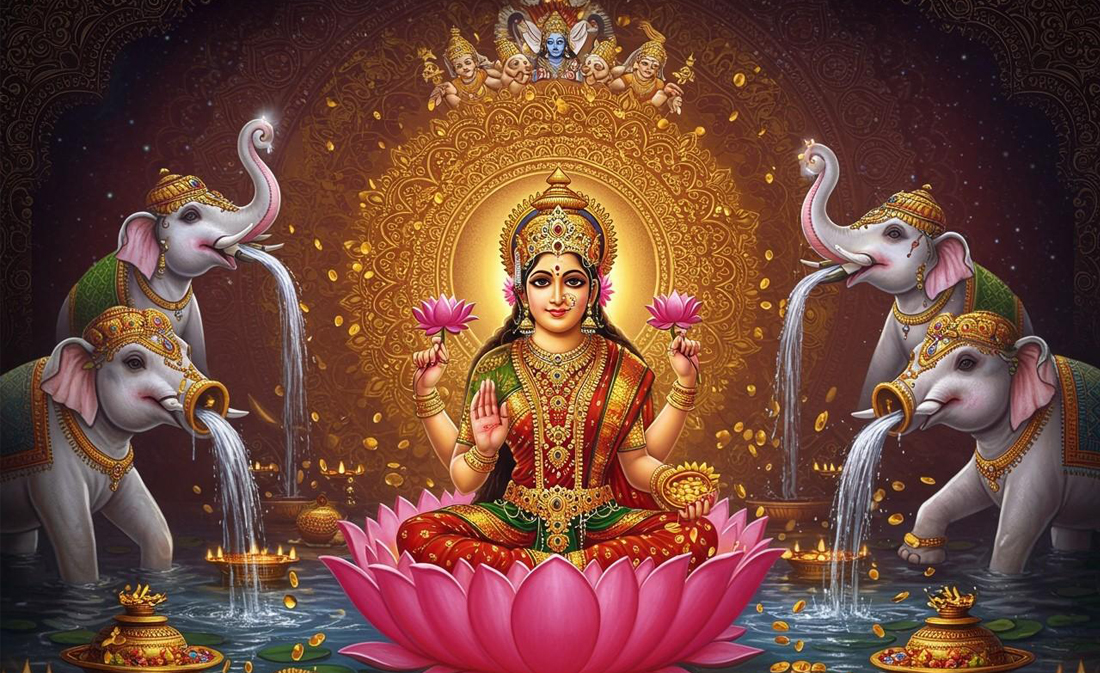- The first mantra is dedicated to Adi Laxmi:
- The second mantra is the praise of Dhanya Laxmi (The Laxmi Grains, fruits, herbs and agriculture wealth):
- The third mantra is dedicated to Dhairya Laxmi (The Laxmi of inner strength):
- The fourth mantra is dedicated to Gaja Laxmi (The Laxmi of graceful as elephants with generous in nature):
- The fifth mantra is dedicated to Santana Laxmi (The Laxmi of Progeny):
- The sixth mantra is dedicated to Vijaya Laxmi (Goddess of victory):
- The seventh mantra is dedicated to Vidya Laxmi (Laxmi of Knowledge):
- The eighth mantra is dedicated to Dhana Laxmi (Laxmi of wealth):
- In Sanskrit
- In English
Ashta Lakshmi Stotram - Powerful Prayer of Goddess Laxmi
Worship the 8 Divine Forms of Goddess Lakshmi
Ashta Lakshmi stotram is a sacred prayer written in the Sanskrit language by Sage Vyasa. Laxmi is the Goddess of wealth and abundance.

In the ancient sacred scriptures of Vedas the divine Mother Lakshmi is praised, Laxmi as the provider of various types of wealth needed in one individual’s life such as fame, knowledge, courage and strength, success in endeavors, happy family relationships, grains and herbs in abundance, peace and bliss, ability to lead a life for higher aims with higher thinking, good health and long life.
THE FIRST MANTRA IS DEDICATED TO ADI LAXMI:
Oh, Adi Laxmi who is worshipped by all righteous-minded people and adored as vernal beauty, who is the sister of the moon God ‘Chandra’ and the embodiment of beautiful golden rays. Please protect us always.
Adi Laxmi is surrounded by the assembly of sages rich in their supernatural powers, who grant the supreme boon of enlightenment to those who seek Your protection! Kindly protect us always!
Adi Laxmi who speaks soft and sweet words as though she sings, who is praised by the eternal Vedas. Please protect me always!
The Laxmi who has the abode of lotus and worshipped by powerful deities always! Oh, Adi Laxmi, who is the embodiment of tranquility! Please protect us always!
Unlimited victory to the Laxmi who is very dear to Lord Vishnu (the Absolute Truth), who showers auspicious attributes of her grace on her devotees, kindly protect us always!
THE SECOND MANTRA IS THE PRAISE OF DHANYA LAXMI (THE LAXMI GRAINS, FRUITS, HERBS AND AGRICULTURAL WEALTH):
Dhanya Laxmi who is indeed the remover of the afflictions of Kali Yuga (the Iron Age) such as heavy rains and floods that interfere with successful harvest and harmony of the planet earth. Please protect us always!
The Laxmi is a conferrer of all kinds of auspiciousness, who resides on the lotus flower whose feet are sought as protection by the assembly of deities or divine beings. Kindly protect us always!
Victory to Thee, Dhanya Laxmi, who is the object of adoration of Lord Madhusudana (the absolute truth)!
THE THIRD MANTRA IS DEDICATED TO DHAIRYA LAXMI (THE LAXMI OF INNER STRENGTH):
Dhairya Laxmi is the Laxmi of courage, valor, and strength. She is the best among beautiful women, who destroys our fears of illusion or mental blockages created by worldly people. Devi who liberates us from our crushing sins, whose feet are worshipped by holy sadhus for the goal of achieving immortality. Dhairya Laxmi, the beloved of Lord Madhusudana (absolute truth), who is ever victorious kindly protect us always!
THE FOURTH MANTRA IS DEDICATED TO GAJA LAXMI (THE LAXMI OF GRACEFUL AS ELEPHANTS WITH GENEROUS IN NATURE):
The Gaja Laxmi is the giver of power, intelligence, and gloriousness. She emerged during the churning of the oceans by the divine beings (Devtas) and the demons (Rakshas). She personifies the protection from evils as well as abundant grace and blessings for increased prosperities!
Gaja Laxmi, who removes our misfortunes and who grants us light and happiness and is worshipped by the entire world. Her glances are so affectionate toward Lord Jagadishan, the creator of all universes. Taking refuge at her sacred feet removes the misery caused in physical, environmental and spiritual planes. Gaja Laxmi, the Laxmi of prosperity, the beloved of Lord Madhusudana (absolute truth), kindly protect us always!
THE FIFTH MANTRA IS DEDICATED TO SANTANA LAXMI (THE LAXMI OF PROGENY):
The entire universe is born from the divine mother’s womb, whether it is animate or inanimate. Santana Laxmi is the divine mother who symbolizes fertility and blesses childless couples to attain parenthood.
Santana Laxmi who is worshipped by the melody of seven svaras (seven musical notes) of the music. She pacifies all emotions with her knowledge of good qualities. She is worshipped by all deities, sages, and humans. Oh Devi, Santana Laxmi, the beloved of Lord Madhusudana (Absolute Truth), kindly protect us always!
THE SIXTH MANTRA IS DEDICATED TO VIJAYA LAXMI (GODDESS OF VICTORY):
Vijaya means victory in all hurdles of daily life to achieve success. She, who blesses us to win over our enemies in the battles, her existence in our lives illustrates as a guiding force of our inner self to be prosperous and to conquer our lower version of our self.
Victory to Vijaya Laxmi, thee who grants salvation to her devotees with the knowledge of absolute universal reality. I honor the Devi who permeates with music, who is worshipped by playing musical instruments such as Veena, Mridangam(a two-sided drum originating in ancient times), tabla (a pair of small drums played with fingers and palms), flute (venu) and so on. It is easy to please her by offering kumkum (saffron powder) and a prayer. I take refuge at the Devi’s sacred feet, kindly protect us always.
THE SEVENTH MANTRA IS DEDICATED TO VIDYA LAXMI (LAXMI OF KNOWLEDGE):
Men who desire intense transcendental knowledge or who dedicate themselves to noble works worship Vidya Laxmi. Vidya means sacred knowledge. Vidya Laxmi is also saluted as Laxmi Saraswati who grants the boon of self-knowledge.
The Laxmi who dispels our sorrows, who is an abode of tranquility and with a smiling face who chase away the bad effects of nine types of wealth (Nav Nidhi). I bow down to boon-giving Veda mother (mother of higher wisdom), kindly protect us always.
THE EIGHTH MANTRA IS DEDICATED TO DHANA LAXMI (LAXMI OF WEALTH):
Dhana means a wealth of virtues and abundance. Dhana Laxmi removes poverty and fulfills your desires for wealth manifestation.
Devi Dhana Laxmi, who symbolizes full perfection with the dhimi dhimi sounds produced by vibrations of the drum and sacred sounds of the conch. Oh Devi who is worshipped in sacred scriptures such as Vedas and Puranas, the darling of Lord Madhusudana (absolute truth), kindly protects us always.
IN SANSKRIT
आदिलक्ष्मि
सुमनस वंदित सुंदरि माधवि, चंद्र सहोदरि हेममये
मुनिगण वंदित मोक्षप्रदायनि, मंजुल भाषिणि वेदनुते ।
पंकजवासिनि देव सुपूजित, सद्गुण वर्षिणि शांतियुते
जय जयहे मधुसूदन कामिनि, आदिलक्ष्मि परिपालय माम् ॥ १ ॥
धान्यलक्ष्मि
अयिकलि कल्मष नाशिनि कामिनि, वैदिक रूपिणि वेदमये
क्षीर समुद्भव मंगल रूपिणि, मंत्रनिवासिनि मंत्रनुते ।
मंगलदायिनि अंबुजवासिनि, देवगणाश्रित पादयुते
जय जयहे मधुसूदन कामिनि, धान्यलक्ष्मि परिपालय माम् ॥ २ ॥
धैर्यलक्ष्मि
जयवरवर्षिणि वैष्णवि भार्गवि, मंत्र स्वरूपिणि मंत्रमये
सुरगण पूजित शीघ्र फलप्रद, ज्ञान विकासिनि शास्त्रनुते ।
भवभयहारिणि पापविमोचनि, साधु जनाश्रित पादयुते
जय जयहे मधु सूधन कामिनि, धैर्यलक्ष्मी परिपालय माम् ॥ ३ ॥
गजलक्ष्मि
जय जय दुर्गति नाशिनि कामिनि, सर्वफलप्रद शास्त्रमये
रधगज तुरगपदाति समावृत, परिजन मंडित लोकनुते ।
हरिहर ब्रह्म सुपूजित सेवित, ताप निवारिणि पादयुते
जय जयहे मधुसूदन कामिनि, गजलक्ष्मी रूपेण पालय माम् ॥ ४ ॥
संतानलक्ष्मि
अयिखग वाहिनि मोहिनि चक्रिणि, रागविवर्धिनि ज्ञानमये
गुणगणवारधि लोकहितैषिणि, सप्तस्वर भूषित गाननुते ।
सकल सुरासुर देव मुनीश्वर, मानव वंदित पादयुते
जय जयहे मधुसूदन कामिनि, संतानलक्ष्मी परिपालय माम् ॥ ५ ॥
विजयलक्ष्मि
जय कमलासिनि सद्गति दायिनि, ज्ञानविकासिनि गानमये
अनुदिन मर्चित कुंकुम धूसर, भूषित वासित वाद्यनुते ।
कनकधरास्तुति वैभव वंदित, शंकरदेशिक मान्यपदे
जय जयहे मधुसूदन कामिनि, विजयलक्ष्मी परिपालय माम् ॥ ६ ॥
विद्यालक्ष्मि
प्रणत सुरेश्वरि भारति भार्गवि, शोकविनाशिनि रत्नमये
मणिमय भूषित कर्णविभूषण, शांति समावृत हास्यमुखे ।
नवनिधि दायिनि कलिमलहारिणि, कामित फलप्रद हस्तयुते
जय जयहे मधुसूदन कामिनि, विद्यालक्ष्मी सदा पालय माम् ॥ ७ ॥
धनलक्ष्मि
धिमिधिमि धिंधिमि धिंधिमि-दिंधिमि, दुंधुभि नाद सुपूर्णमये
घुमघुम घुंघुम घुंघुम घुंघुम, शंख निनाद सुवाद्यनुते ।
वेद पूराणेतिहास सुपूजित, वैदिक मार्ग प्रदर्शयुते
जय जयहे मधुसूदन कामिनि, धनलक्ष्मि रूपेणा पालय माम् ॥ ८ ॥
फलशृति
श्लो॥ अष्टलक्ष्मी नमस्तुभ्यं वरदे कामरूपिणि ।
विष्णुवक्षः स्थला रूढे भक्त मोक्ष प्रदायिनि ॥
श्लो॥ शंख चक्रगदाहस्ते विश्वरूपिणिते जयः ।
जगन्मात्रे च मोहिन्यै मंगलं शुभ मंगलम् ॥
IN ENGLISH
Adilakṣmi
sumanasa vandita sundari mādhavi, candra sahodari hemamaye
munigaṇa vandita mokṣapradāyani, mañjula bhāṣiṇi vedanute |
paṅkajavāsini deva supūjita, sadguṇa varṣiṇi śāntiyute
jaya jayahe madhusūdana kāmini, ādilakṣmi paripālaya mām || 1 ||
Dhānyalakṣmi
ayikali kalmaṣa nāśini kāmini, vaidika rūpiṇi vedamaye
kṣīra samudbhava maṅgaḷa rūpiṇi, mantranivāsini mantranute |
maṅgaḷadāyini ambujavāsini, devagaṇāśrita pādayute
jaya jayahe madhusūdana kāmini, dhānyalakṣmi paripālaya mām || 2 ||
Dhairyalakṣmi
jayavaravarṣiṇi vaiṣṇavi bhārgavi, mantra svarūpiṇi mantramaye
suragaṇa pūjita śīghra phalaprada, ṅñāna vikāsini śāstranute |
bhavabhayahāriṇi pāpavimocani, sādhu janāśrita pādayute
jaya jayahe madhu sūdhana kāmini, dhairyalakṣmī paripālaya mām || 3 ||
Gajalakṣmi
jaya jaya durgati nāśini kāmini, sarvaphalaprada śāstramaye
radhagaja turagapadāti samāvṛta, parijana maṇḍita lokanute |
harihara brahma supūjita sevita, tāpa nivāriṇi pādayute
jaya jayahe madhusūdana kāmini, gajalakṣmī rūpeṇa pālaya mām || 4 ||
Santānalakṣmi
ayikhaga vāhini mohini cakriṇi, rāgavivardhini ṅñānamaye
guṇagaṇavāradhi lokahitaiṣiṇi, saptasvara bhūṣita gānanute |
sakala surāsura deva munīśvara, mānava vandita pādayute
jaya jayahe madhusūdana kāmini, santānalakṣmī paripālaya mām || 5 ||
Vijayalakṣmi
jaya kamalāsini sadgati dāyini, ṅñānavikāsini gānamaye
anudina marcita kuṅkuma dhūsara, bhūṣita vāsita vādyanute |
kanakadharāstuti vaibhava vandita, śaṅkaradeśika mānyapade
jaya jayahe madhusūdana kāmini, vijayalakṣmī paripālaya mām || 6 ||
Vidyālakṣmi
praṇata sureśvari bhārati bhārgavi, śokavināśini ratnamaye
maṇimaya bhūṣita karṇavibhūṣaṇa, śānti samāvṛta hāsyamukhe |
navanidhi dāyini kalimalahāriṇi, kāmita phalaprada hastayute
jaya jayahe madhusūdana kāmini, vidyālakṣmī sadā pālaya mām || 7 ||
Dhanalakṣmi
dhimidhimi dhindhimi dhindhimi-dindhimi, dundhubhi nāda supūrṇamaye
ghumaghuma ghuṅghuma ghuṅghuma ghuṅghuma, śaṅkha nināda suvādyanute |
veda pūrāṇetihāsa supūjita, vaidika mārga pradarśayute
jaya jayahe madhusūdana kāmini, dhanalakṣmi rūpeṇā pālaya mām || 8 ||
Phalaśṛti
ślo|| aṣṭalakṣmī namastubhyaṃ varade kāmarūpiṇi |
viṣṇuvakṣaḥ sthalā rūḍhe bhakta mokṣa pradāyini ||
ślo|| śaṅkha cakragadāhaste viśvarūpiṇite jayaḥ |
jaganmātre ca mohinyai maṅgaḷaṃ śubha maṅgaḷam ||
FAQ's
Frequesntly Asked Questions About Gayatri Mantra:
Q1 - What are the 8 forms of Lakshmi?
Ans: The 8 forms of Goddess Lakshmi, known as Ashta Lakshmi, are Adi Lakshmi, Dhanya Lakshmi, Dhairya Lakshmi, Gaja Lakshmi, Santana Lakshmi, Vijaya Lakshmi, Vidya Lakshmi, and Dhana Lakshmi. Each form represents a different type of wealth, prosperity, and well-being.
Q2 - What is the Ashtalakshmi Gayatri Mantra?
Ans: "ॐ श्री महालक्ष्म्यै च विद्महे विष्णुपत्न्यै च धीमहि। तन्नो लक्ष्मी प्रचोदयात्॥"
This sacred mantra is chanted to invoke the blessings of the eight divine forms of Goddess Lakshmi for wealth, prosperity, and spiritual abundance.
Related Blogs
No related blogs found.

